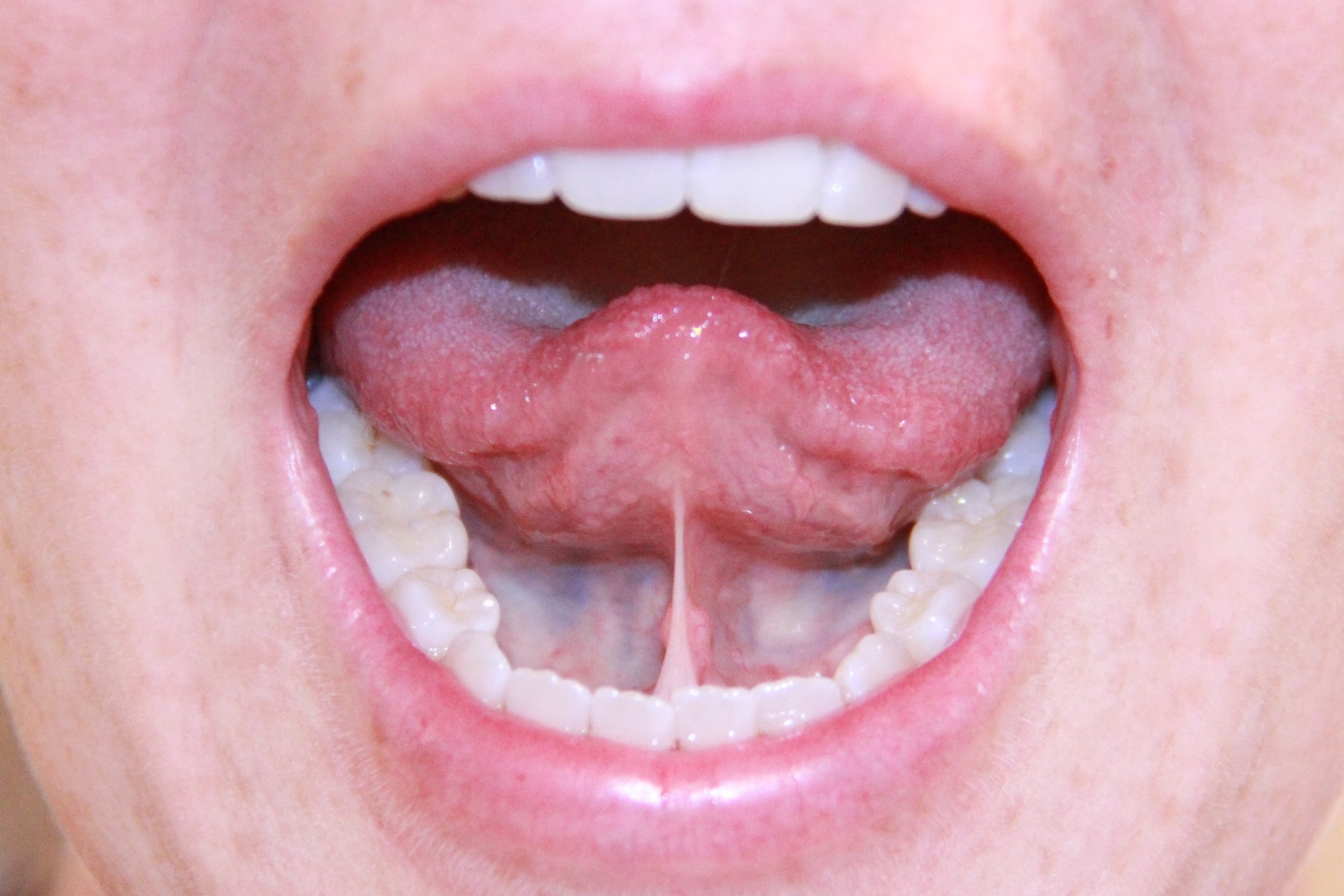I'm tongue tied?! Why has no one told me before now?
I asked this exact question myself not too long ago.
In the fall of 2016, after searching for answers about my chronic headaches and jaw pain, I stumbled upon a blog post titled "Do you grind your teeth? Maybe your tongue is the problem." I was intrigued at this blogger's claim that tongue-tie could be related to teeth grinding, jaw pain, headaches and more. Surely I, as a Registered Dental Hygienist of over 14 years at that time and having observed the mouths of thousands of patients, would know if I was tongue-tied, right? I mean, I knew I was breastfed as a baby, I didn't have any speech concerns and I could kind of stick out my tongue, so clearly I couldn't have a tongue- tie!
Well, after doing a bit more research and examining the appearance and function of my tongue more closely, I realized it was true. I had a tongue-tie. And a pretty significant one at that!
So how could I have lived my whole life with this tongue-tie and never have anyone mention it before? And, as a Dental Hygienist, how did I not know how to spot a tongue-tie in my patients?
My tongue tie
What I know now, after completing training in Orofacial Myofunctional Therapy(OMT) and seeing many patients with a tongue-tie is the answer to that question is easy. Information about oral restrictions, including how to visually detect a tongue-tie and recognize and connect the signs and symptoms are simply not well taught to or understood by many healthcare professionals.
Unless a healthcare provider has specifically sought out continuing education courses to further their knowledge in the subject of tethered oral tissues (TOTs), then their understanding of a tongue-tie may only stem from the one or two slides they were shown in their college or university course.
We want to believe in our Doctors, Paediatricians, Dentists and other healthcare providers that they know, understand and have answers to our health concerns, but what if when it comes to tongue-tie, that they simply don't know what they're looking for? What if they were told, like me, that unless there is an issue with breastfeeding or speech, that a tongue-tie is of no significance?
Common signs and symptoms of tongue-tie
Let's have a look at some of the common symptoms and signs of tongue-ties. Symptoms vary widely among different age groups. But, if you ask me, I would say these are all very real and significant symptoms and should not be ignored or brushed off as "normal."
Infants/Babies
difficulty breastfeeding
painful or poor latch
reflux
frequent nursing
poor weight gain
poor sleep
Toddlers/Children
easy gagging or choking on foods
messy or noisy eating, chewing with mouth open
delay or difficulty with speech
mouth breathing
ear infections
teeth grinding
snoring
poor sleep
Adults
headaches or migraines
neck and shoulder pain
TMJ (jaw) pain
teeth grinding or clenching
snoring or sleep apnea
chronic fatigue
teeth shifting or orthodontic relapse
mouth breathing
narrow jaws
tripping over words when speaking
chewing fast or with mouth open
gagging or choking easily
Common myths about tongue-ties
The biggest myth, or misconception I come across is that if you can stick out your tongue, you are not tongue-tied. This is highly incorrect information. Many of the patients I see with tongue-tie can in fact stick out their tongue. Some maybe all the way to their chin. But the ability to stick out one's tongue doesn't tell us anything. It is the range of motion inside of the mouth with the tongue and the ability to elevate the middle and back of the tongue up to the roof of the mouth that is key in determining the presence of tongue-tie.
Another common myth is that a person who is tongue-tied will have issues with their speech. While there are many connections between tongue-tie and speech sounds, I have met many patients who are tongue-tied and do not have any speech concerns. The presence or absence of speech concerns is not enough to diagnose or rule out the presence of a tongue-tie.
Tongue ties are starting to get more recognition
Tongue-tie is a topic that keeps coming up in my Myofunctional Therapy practice. Many patients are seeking out treatment specifically for tongue-tie after doing their own research. I also often meet patients who have lived with the symptoms and limitations of tongue-tie for their entire lives and I may often be the first professional to point out a tongue-tie to them. When I review many of the above symptoms of a tongue-tie, patients or parents start to connect the dots to other issues they may be noticing, and it all seems to start make sense.
The great news is that since completing my OMT training and being immersed in the field of Orofacial Myology, I have been fortunate to connect with and come across so many like-minded professionals when it comes to looking at tongue-ties and how they affect not just breastfeeding and speech, but our bodies as a whole. We are working together to educate other healthcare providers about the understanding of symptoms of a tongue-tie and the significance of screening patients for a tongue- tie when those symptoms are present.
I think I might be tongue-tied, so what now?
If you think you or your child might be tongue-tied, the best thing to do is to have an evaluation by an Orofacial Myofunctional Therapist. I screen every patient for a tongue-tie during an evaluation. Your OMT will be able to detect and assess tongue-tie and guide you on the right path for treatment. In some cases, a simple surgical procedure called a frenectomy may be required in your treatment and your OMT will help you find an appropriate provider.
For more information, please feel free to get in touch with me here or leave a comment below. I'm always more than happy to have a chat about tongue-ties!
Kim Kung, RDH, Orofacial Myofunctional Therapist




